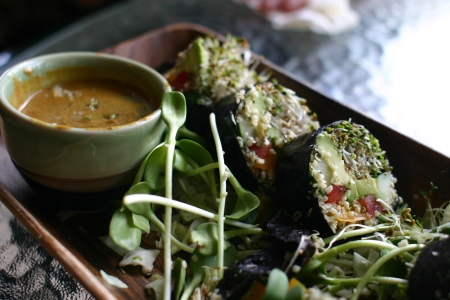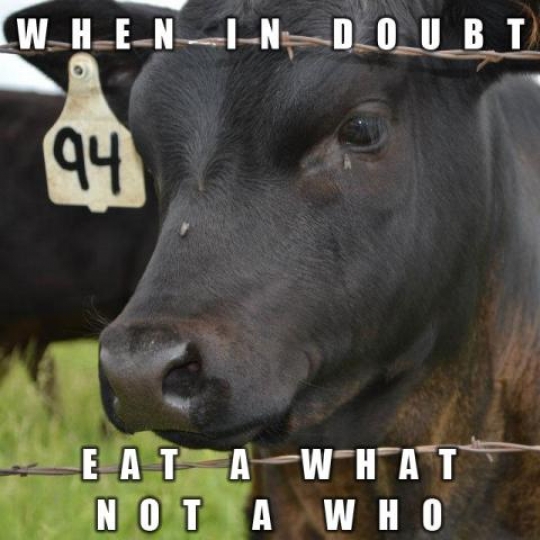A friend's dad has been going through some serious health issues that have impacted his quality of life. Though it's hard to point to a cause in any particular case, his symptoms are all strongly associated with animal foods. She's been frustrated and scared because even though all the evidence is there, he won't make even minimal changes to the way he eats. Not even to save his own life.
When confronted with death, a lot of us make big life changes to avoid it. We stop smoking after a cancer diagnosis, start exercising for heart disease, and so on. But not all of us do that. When my friend's dad's concession to his health was to only eat beef three times a week (as a treat) and eat other types of meat for the rest of his meals, I kind of got it. I don't know him, but I can see someone's thought process going like this:
Option A: Enjoy every moment of my life, as much as I am able, and eventually die. Meanwhile I'll probably increasingly suffer from this disease.
Option B: Radically change my life. I won't enjoy any meal again because healthy food is gross. I will never feel full. My disease might get a little better but I'll be suffering constantly in a different way. It might take longer but I'll still die.
I'm not vegan for health reasons, so this never really entered my own thought process when I considered the switch. But when it comes to making choices merely for my own benefit, it's hugely relevant. Giving up the things we love in order to prolong our lives or get into a particular shape often just doesn’t seem worth it. When I hover around the idea of taking up exercising, I can't help but feel like I will wind up spending thousands of hours over a lifetime running in place, lifting heavy things, and setting heavy things down. And I just don't make myself do it.
It's become a truism that change is scary, but it's worth repeating. I get why people don't want to give up the things they enjoy, or break out of the attitudes that we were raised with. Or the attitudes that the government and advertising feed us. (Yes, the government has been telling us to eat animal products, and no, they aren't doing so for our benefit).
I first went vegetarian when I was 14. It probably lasted a week.
I got a lot of bad reactions. People didn't understand; they thought it was unhealthy; they didn't want to accommodate me. I got tired of the difficulty and went back to eating meat for another four years, until I finally felt able to tackle it. And then I discovered it wasn't really that hard.
Instead of giving things up, I gained things. Cooking experience. Openness to new cuisines and flavors. Peace of mind that I was finally living my values. I was only really giving up a small number of ingredients. There was still an abundance of food to enjoy.
When I was still transitioning, but already pretty well transitioned, I started craving lunch meat ham. I resisted for a long time and then stuffed a few pieces in my face. To my surprise, I found it almost tasteless. Something I had loved had become completely boring to me. That memory has really stuck with me. The things we crave don't always satisfy us once we get them, and we can get along fine without them if there's a good reason to give them up. It just takes a little time.
Only many years later did I discover this maxim from the philosopher Epicurus:
Evaluate each of your desires by this question:
"What will happen to me if that which this desire seeks is attained,
and what if it is not?"
He was a brilliant philosopher who taught that the fear of a thing is usually worse than the thing itself will be. He was also believed to be an ethical vegetarian but it's hard to know for sure. I recite the above maxim a lot lately. It really puts things into perspective when I find myself desiring something that I can't attain, or that I choose, for whatever reason, not to seek out.
It seems like a different person when I look back on the me that wanted to be vegetarian but said he could never give up meat. But during all that time - the 14 years before I decided to be vegetarian, the four years when I wanted to be but couldn't seem to muster it, and the two years of being ovo-lacto before finally going all the way - I was an animal lover.
People's animal companions have always gravitated toward me. Maybe because they can sense I love animals, most likely because my body language says I'm open to being approached. I was always against hunting, wearing fur, and the more "obvious" animal abuses. Decades ago I started my habit of watching every step so I wouldn't step on an ant. But I still ate animals. So I don't devalue anyone's love for animals, even if they're not vegan yet.
After my first brief flirtation with vegetarianism, I started giving prayers of thanks at mealtimes to the animals I was eating. My current opinion is that the animals neither hear my thanks nor care, and my goal is not to do anything I need to apologize for in prayer. But at the time it felt meaningful. It felt like a concession to an ugly necessity. I even gave a prayer of thanks when I bought a completely superfluous leather jacket. However silly I feel now for doing it, I meant it seriously at the time. I try to remember that when I hear people defending what I consider violent actions. I remember that I used to, too.
Change is hard and we don't want to feel like we've been doing something terrible all our lives. But when you know better, do better.
There are plenty of ways to ease into it if you're interested in giving veganism a try. You can factor out one type of animal product at a time. Or you can make a certain amount of meals a day vegan, or a certain amount of days of the week vegan. Meatless Mondays are getting more and more popular. Think of it as a time to test the waters, test your mettle, and expand your food horizons. You might find that you feel better and that you don't miss the old ways of doing things at all. If you really want to give it a solid try, you might consider the 30 Day Vegan Challenge, also available in book form.
I want to repeat Epicurus' maxim again.
Evaluate each of your desires by this question:
"What will happen to me if that which this desire seeks is attained,
and what if it is not?"
The consequences of adopting a more compassionate lifestyle are usually not as significant as we think they will be, and there will often be some un-thought-of benefits. The consequences for not choosing compassion are quite severe, though we are not the ones to pay that price.
Foregoing steak is not a hardship. Living your whole life in a crate and then having your throat slit is a hardship.




Leave a comment!